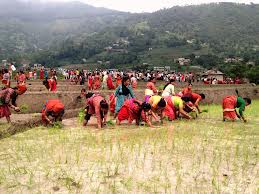‘Nepalis much aware to climate change impacts among fellow Asians’

KATHMANDU, Nepal- A recent survey by BBC Media Action, BBC’s charity for international development, has revealed that Nepalis are much more aware to the climate change, its impact and consequences in the environment compare to the citizens of other seven Asian nations.
The survey reports showed that out of the seven countries in the largest continent, people in Nepal were most willing to make changes in their livelihoods and lifestyle. The research also found that women farmers were more innovating than men and also ahead of men in growing different crops and trying to improve soil fertility.
According to the research findings, farmers in Nepal were searching for information to tackle environmental changes.
Media Action further stated that Nepalis, who expressed a strong sense of attachment to their environment, are taking action such as planting trees, rotating crops or making water safer to drink. Twenty per cent of respondents had made changes to their livelihood, including supplementing their income or migrating.
Launching the findings of its study in Asia about how people were coping with climate change at a press meet here on Tuesday, Media Action said the ‘Climate Asia’ report reveals a comprehensive picture of how people from poor farmers to urban professionals are responding to change in their environment and maps where communities are struggling to adapt.
According to the report, 80 per cent of survey respondents said lack of information was stopping them from taking action while 60 per cent said agricultural productivity had decreased and that extreme weather events had risen.
Respondents described a changing environment with 63 per cent more erratic rainfall and 85 per cent sharp increase in pests, both of which are threatening crops, livelihood and food security.
Out of 33,500 respondents in the all the seven countries including Bangladesh, China, India, Indonesia, Nepal, Pakistan and Vietnam, the study had 2,315 respondents in Nepal.
“Almost all of the 33,500 respondents across seven countries identified significant changes in their environment and basic resources — from increasing temperatures and extreme weather events — to decreases in water and food”, said the report.

